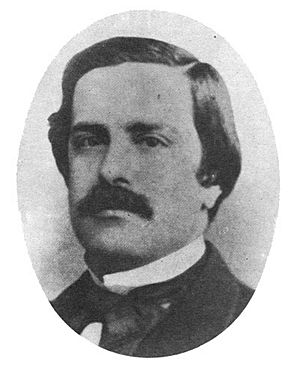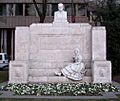Juan Valera y Alcalá-Galiano facts for kids
Quick facts for kids
The Most Excellent
Juan Valera
|
|
|---|---|

Juan Valera
|
|
| Born | Juan Valera y Alcalá-Galiano 18 October 1824 Cabra (Córdoba), Spain |
| Died | 18 April 1905 (aged 80) Madrid, Spain |
| Occupation | Politician, diplomat |
| Seat I of the Real Academia Española | |
| In office 16 March 1862 – 18 April 1905 |
|
| Preceded by | Jerónimo del Campo y Roselló |
| Succeeded by | Santiago Ramón y Cajal |
Juan Valera y Alcalá-Galiano (born October 18, 1824 – died April 18, 1905) was a famous Spanish writer. He was also a diplomat, which means he represented his country in other nations. On top of that, he was a politician, helping to make decisions for Spain.
Juan Valera's Life and Career
Juan Valera was born in a town called Cabra in Spain. He studied law at the University of Granada. After finishing his studies, he started a career in diplomacy in 1847. This meant he traveled to many different countries to work for the Spanish government.
Over the next 50 years, Valera held many important jobs. He worked in places like Lisbon, Rio de Janeiro, Dresden, and St. Petersburg. He even wrote a book called Cartas desde Rusia (Letters from Russia) where he playfully teased another diplomat.
When he returned to Madrid, he became an editor for a newspaper. He was also appointed as a Minister to Frankfurt. After a big change in government in 1868, he got even more important roles. He became an Assistant Secretary of State and later the Director of Public Instruction, which meant he was in charge of education.
During the time of King Alphonso XII, Valera continued his diplomatic work. He served as a Minister in Lisbon, Washington, and Brussels. Later, he was an Ambassador to Vienna. In 1900, he was chosen to join a special group called the Academy of Moral and Political Sciences.
Valera's Famous Books
Even though Juan Valera was busy with his diplomatic and political jobs, he still found time to write amazing books. His writing style was known for being very clear and beautiful. Many people in Spain believe he was one of the best writers of his time.
His most famous book is Pepita Jiménez, which came out in 1874. This story has been translated into many languages around the world. It's about a young man who is studying to become a priest. He slowly realizes that this path might not be right for him.
Valera wrote other novels too, including:
- Las ilusions del doctor Faustino (1875)
- El comendador Mendoza (1877)
- Pasarse de listo
- Doña Luz (1879)
These novels were mostly written when he took a break from his political work. Juan Valera also believed in the idea of Iberian Federalism. This meant he thought Spain and Portugal should work very closely together, almost like a team.
Images for kids
-
Monument to Valera in Madrid
See also
 In Spanish: Juan Valera para niños
In Spanish: Juan Valera para niños
 | Sharif Bey |
 | Hale Woodruff |
 | Richmond Barthé |
 | Purvis Young |


